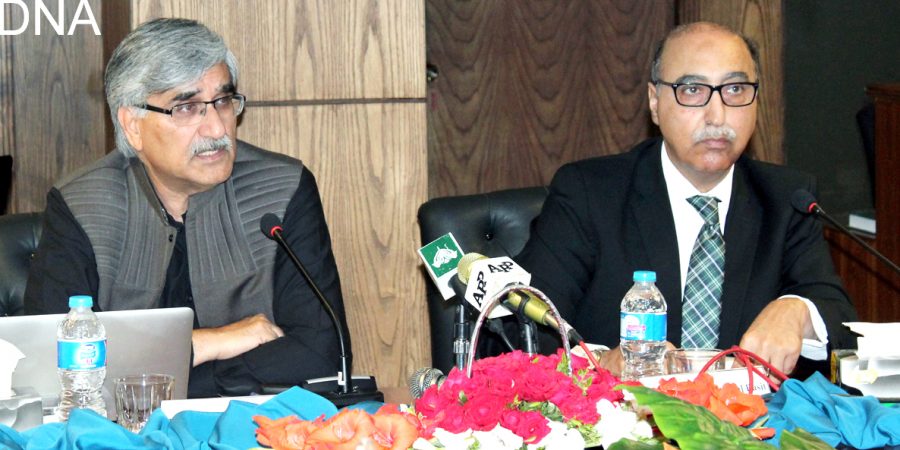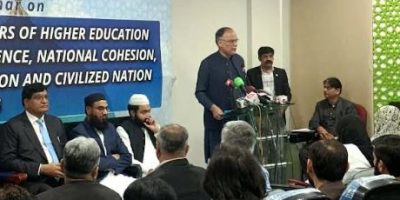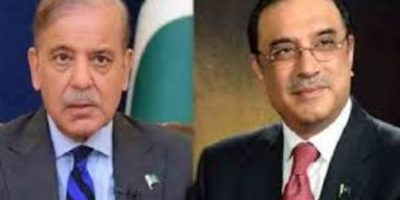18th amendment poses problems for national identity of Pakistan: President PILDAT

ISLAMABAD, APR 11 (DNA) – On the 8th anniversary of the 18th Constitutional Amendment, serious soul-searching is required to see what it has failed to achieve, whether there are lessons to be learned to modify it and remove bottlenecks to improve its implementation and make changes.
The Amendment is a reality – a political reality – passed unanimously so it cannot be wished away. But while it does not pose challenges to federalism since it can be modified the way a state wants, the 18th Constitutional Amendment does pose problems for the national identity and integrity of the state of Pakistan.
This was shared by Mr Ahmed Bilal Mehboob, President Pakistan Institute of Legislative Development and Transparency (PILDAT) at the lecture on ‘18th Amendment and Challenges to Federalism’ organised by the Islamabad Policy Research Institute (IPRI) here in Islamabad today.
‘We have no option but to make local governments more meaningful and effective if the real purpose of the Amendment to serve local people, and maintain the integrity and national identity of the country is to be fulfilled’, Mr Mehboob stressed. A constitution is not a static document and the impacts of this Amendment should be openly debated, and the Concurrent Legislative List should be immediately restored, he recommended.
Providing detailed overview of federalism in the subcontinent, from the 1914 Lucknow Pact, 1919 Mantague-Chelmsford Reforms, Jinnah’s 14 Points in 1928, Allama Iqbal’s visionary 1930 Allahabad address, the 1935 Government of India Act, and Quaid-i-Azam’s 1945 interview, Mr Ahmed Bilal said that ‘we should remember that pre-independence India had an entirely different context for federalism, and how and how much it has changed for Pakistan post- 14 August 1947.’
While going over Pakistan’s post-1971 constitutional evolution, he said that the 18th Amendment did not take place in a vacuum. Rather the varied perceptions about the reasons for the separation of East Pakistan, the defacement of the 1973 Constitution, the strains between the Centre and provinces especially then-NWFP and Balochistan, the 1999 Coup and 17th Amendment all led to the need for constitutional reforms to bring it back to its original 1973 spirit and strengthen its parliamentary-federal character.
Mr Mehboob was critical of the process and committee make-up which worked on the 18th Amendment document since over-representation of Senators led to the document being dominated by regional sentiments and diluted the central character of the government. While certain level of confidentiality is necessary, complete and utter secrecy was counter-productive, and the hurried passage of the Amendment provided no time for substantive and open discussions once it was brought to the floor of the Assembly, he observed. Mr Mehboob pointed out that since federalism is a delicate compromise between unity and autonomy, there is a need for mature political ability and legalism for the continuity and success of this system.
‘There must be a deep regard for the Constitution of the state among the polity, and there must be a willingness to accept the decisions of the Parliament and judiciary. Without consent of the masses and the element of legitimacy, a federal system can never exist and operate in its true essence.’
Earlier, Ambassador (R) Abdul Basit, President of IPRI welcoming the participants said the 18th Constitutional Amendment, adopted in April 2010, has been a landmark legislation that has provided a legal framework to enable a democratic devolution that can be termed as a historic achievement to confer democratic rights to the people of Pakistan.
However, Ambassador Basit pointed out that given its important implications for legislative, political and power-sharing arrangements that exist between the federal and provincial governments, this Amendment places increased capacity demands on the role and function of the Provincial Governments, and a greater understanding of and adjustment to this monumental shift on the part of the Federation.
In the Question and Answer session, the participants of the lecture, including former ambassadors, public policy students and media concurred that a committee consisting of legislative experts, parliamentarians, and practitioners should be constituted to study the 18th Constitutional Amendment and see what can be shortened or added (e.g. issues like syllabi and education) since doing away with the Concurrent List altogether was not a prudent step.
There was also agreement that decentralised and inclusive governance will enable the Pakistani federation to accommodate the diverse interests, identities and working of institutions in the country.
Related News

Lahore seminar links Prophet’s “P.B.U.H” life with national cohesion goals
ISLAMABAD/LAHORE, FEB 21 /DNA/ – The Higher Education Commission (HEC), in collaboration with the MinistryRead More

President, PM strongly condemn terrorist attack on security forces in Bannu
ISLAMABAD, Feb 21 (DNA): President Asif Ali Zardari and Prime Minister Muhammad Shehbaz Sharif, Saturday,Read More


Comments are Closed